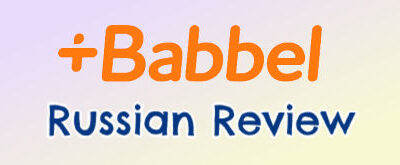Although other language apps like Duolingo and Babbel usually receive more attention, Busuu has a surprising 100 million registered users. It’s a sneaky popular app that’s quickly gaining on the bigger players. In this article, we analyze the pros and cons of the Busuu language program to see whether it lives up to the hype.

Busuu
- Free Version Available
- Money Back Guarantee
Pros
- Videos of native speakers incorporated into lessons (great for visual learners)
- Helpful grammar instruction layered into lessons
- Busuu Premium plans are pretty affordable (as low as $4 per month)
- Personalized review sessions for material retention
- Level completion certificates boost motivation
- Nice community feel with feedback feature
Cons
- Free plan is very limited
- No formal speech recognition technology
- Limited verbal practice
- Curriculum not as deep as other apps
How The Busuu Program Works
I’ve been using Busuu for some time now and there have been quite a few changes over the last 18 months or so. So before I dive into discussing what I like and don’t like about this app, let me quickly break down how this app works. I think this will be especially helpful in light of the major overhaul the app has recently gone through.
To begin, one of the biggest takeaways of the Busuu changes is that they’ve updated the app to be more like Duolingo. Busuu already had a ton of similarities with Duolingo, but now, it’s even more like it. Let me set out some examples:
- Everyday you get three daily challenges with Busuu, just like Duolingo’s three daily quests
- You earn stars with Busuu instead of XP points, though in the same amount
- You compete in leagues in both apps, such as the bronze, silver and gold leagues
- The Busuu daily streak graphic looks identical to Duolingo’s
Bottom line, the two apps have just become eerily similar. However, with that established, there are still a number of fundamental differences between these two apps, and I want to break those down.
When you log in to Busuu, you land on the dashboard, where there are main categories on the top navigation bar. There are three main tabs: Learn, Community, and Review.
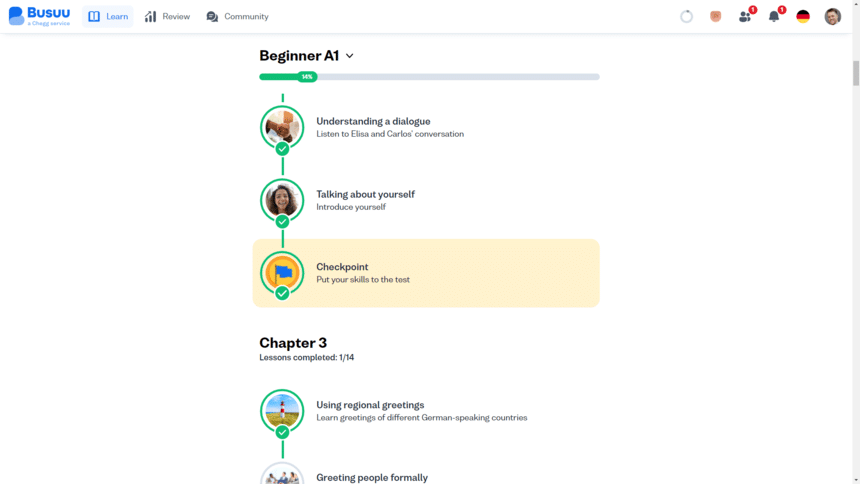
The Learn section contains all of your lessons to work in the Busuu program, ordered in a sequenced path. The lessons are grouped by level and chapter, but generally, Busuu feeds you these lessons in a very direct, progressive fashion. It’s easy to follow the path.
The second tab, Community, is a feature that gives access to all of your friends and other users where you can get and give feedback on your exercises and drills.
Lastly, the Review tab houses all of your vocab review, which you do pre- or post-lesson. This is based largely on the concept of spaced repetition.
Of those three sections, the Learn tab (which again holds the lessons), is by far and away the most important part of the program and where you will likely spend 80% or more of your time in the app.
As for the actual Busuu lessons, each one is very short. Each lesson takes just five minutes to complete on average, and sometimes they even go quicker. This is because each lesson is comprised of just a dozen or so quick-hit drills.
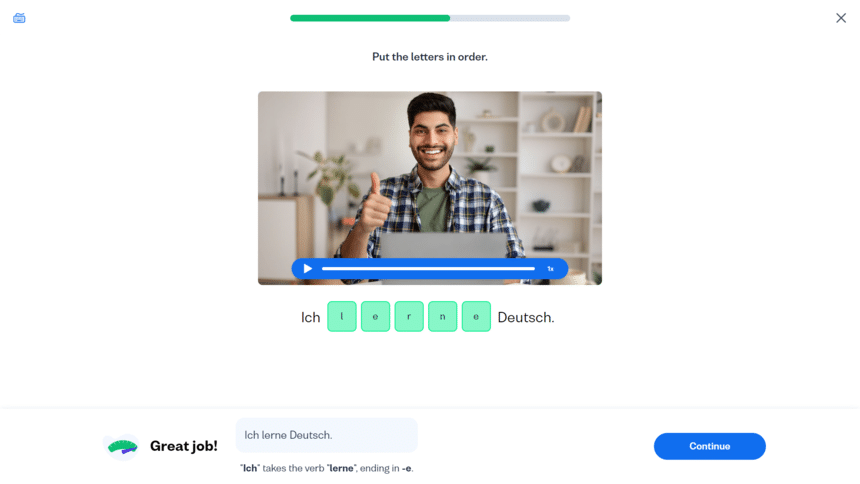
All of these exercises cover the same topic and target words for the lesson, and take a number of formats. There are fill-in-the-blanks, multiple-choice questions, matching pairs, sentence puzzles, short videos, and speaking drills. In those speaking drills you actually record yourself responding to a prompt, and then the recording gets sent to the Busuu community for feedback under the Community tab.
Every couple lessons you’ll be prompted to review the words and phrases you’ve learned up to that point, which all flow through to the Review tab at the top.
In short, Busuu uses a very fast moving, blended approach to learning, where you’re taught the material through a variety of hands-on exercises. As far as the program stands today, the organization and some of the window dressing (like streaks and stars) have changed, but the exercises and drills that make up the heart of Busuu remain relatively unchanged.
Busuu Cost
Next, let’s quickly discuss cost and how Busuu’s pricing compares to other apps.
One of the biggest draws for Busuu is that like Duolingo, they also offer a free version. Again, they’re a lot like Duolingo in many ways. 🤨
However, the free model from Busuu isn’t nearly as good as the free version for Duolingo. With Duolingo’s free version, you can actually use it on a long term basis if you can put up with some minor annoyances (like ads), but Busuu’s free version is more limited.
It has a lot of restrictions around it and I found it be tougher to use long term. If you only want to learn some basics before a trip, it’s fine for that. However, for long term learning, you’re almost certainly going to need to upgrade to their premium plan. Luckily though, that isn’t too bad.
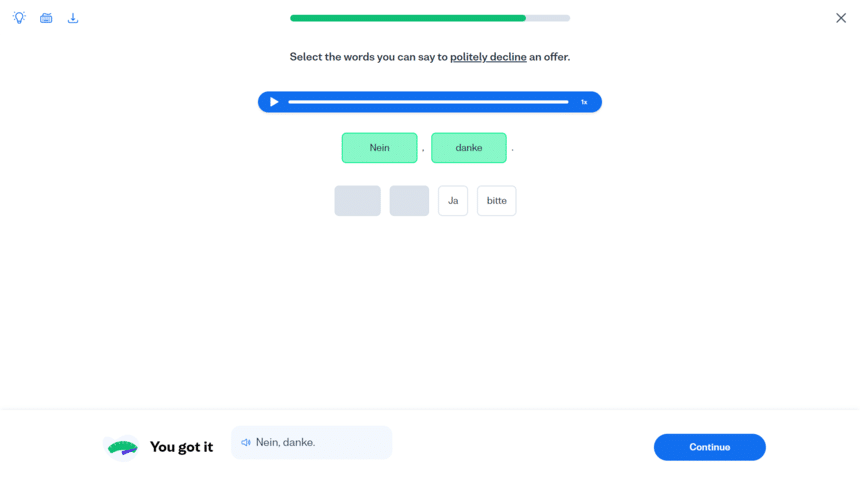
Busuu has three different subscription options to choose from. There is a monthly pay-as-you-go plan, a 6-month plan, and a 12-month plan, which range from around $7 to $14 per month after discounts.
Putting this in perspective, Busuu isn’t the cheapest app we’ve purchased and used, but it’s not the most expensive either—it’s kind of in the middle. It’s more expensive than Memrise and Duolingo, but it’s cheaper than Pimsleur and Rosetta Stone. It’s right in line with Babbel and most other programs.
What Our Team Likes About Busuu
Now that I’ve covered pricing and how the app works, let’s get into what I like and don’t like about Busuu, starting with the pros.
Video Clips of Native Speakers
The first major highlight of the Busuu program in my opinion is that they incorporate video clips of fluent speakers into their lessons. Every few exercises in Busuu, you’ll get a quick clip of a fluent speaker speaking a phrase or sentence in your target language.
This is something missing from most other language apps. Memrise has some videos, but none of the other major programs have this feature, including Rosetta Stone, Duolingo, Babbel, Pimsleur, and Rocket Languages.
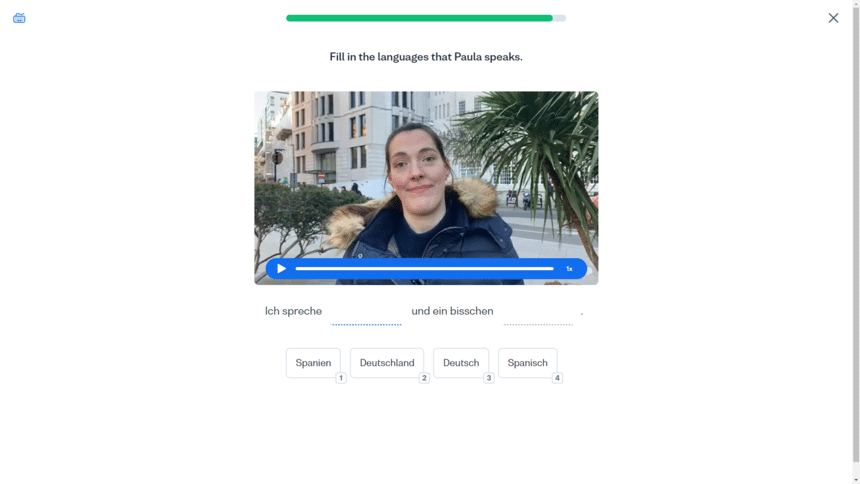
Personally, I like video. I think it’s very beneficial to actually see fluent speakers saying the things you’re learning so can gauge body language, facial expressions, and have a visual memory aid to associate the new words or phrases with. It’s a big value add for visual learners.
Short Lesson Format
Another major advantage for Busuu is that their lessons are so bite-sized. Most other apps have lessons that take 30 to 60 minutes to complete.
There are very few apps that have such short, bite-sized lessons. Therefore, if you’re super busy and just trying to squeeze lessons in throughout the day on the subway or a lunch break, Busuu is perfect for that.
If that sounds like what your approach to language learning is going to look like, Busuu will be a good option for you. I do like how fast and bite-sized the Busuu lessons are.
Review Sessions
The third benefit of using Busuu is their review function. Every couple lessons you are prompted to review the words and phrases you’ve learned up to that point.
It’s usually just a dozen or so words at a time, but sometimes more. Or alternatively, you can always review vocab directly under the Review tab at the top. That’s actually a pretty useful function.
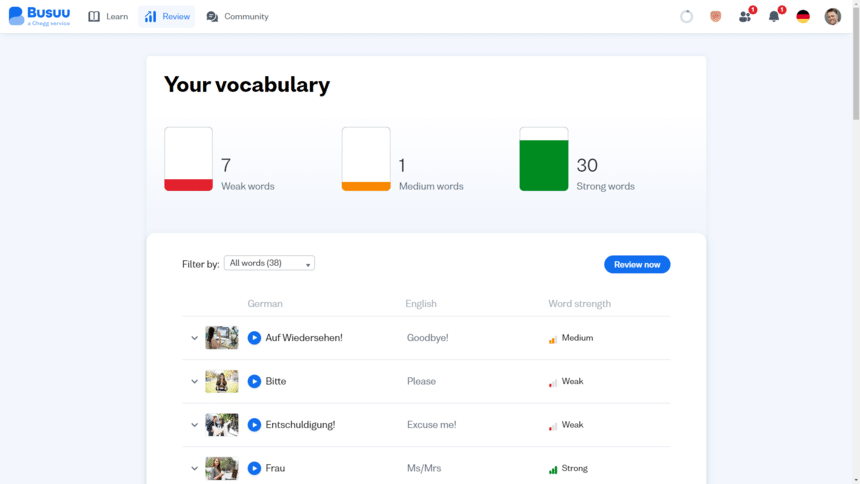
Busuu displays your vocab graphically, including which words are weak, medium and strong, and from there, you can jump into a review session. Either way though—whether you review phrases between lessons on the path or jump into a direct review session—it’s a nice value add.
I am personally a big fan of spaced repetition, and Busuu does a nice job of integrating this function into their program.
Community Feedback
Lastly, the final advantage for Busuu is their community feedback system. As noted, Busuu leverages their entire user base to provide feedback.
For example, if you’re learning Spanish, native Spanish speakers will leave you comments on your verbal and writing practice exercises, and then you can then return the favor by leaving comments for people learning English.

It’s not a perfect system because it does take time to receive feedback, but it definitely personalizes the experience and makes it more social. You can connect with those people who you share feedback frequently and sort of become study buddies. It’s a different system from most other language learning apps and can add a lot of value if you’re looking for a community feel.
What Our Team Does NOT Like About Busuu
Having covered the things we like about Busuu, let’s get to the warts with this program. After all, it’s not all sunshine and roses.
No Speech Recognition Technology
The first negative with Busuu is that there isn’t any speech recognition software. While just about every other language app on Earth at this point provides software to grade your pronunciation, Busuu does not.
Instead, Busuu relies on the community feedback feature noted above. And while I like that tool for what it is, if I had to choose between the two options, I would choose speech recognition software all day.
The software is instantaneous, accurate, and most importantly, consistent. That is sort of the problem with the community feedback—it takes time to get the feedback, sometimes it’s hard to understand, and it’s not always consistent person-to-person.
Thus, I’d like to see Busuu add some speech recognition software to their package. That would be a nice upgrade.
Limited Resources
The second downside of using Busuu is that there aren’t many extra resources and tools outside of the main lesson work. There are the new Duolingo-like features, such as streaks, stars, daily challenges, and league competition, but honestly, it just feels like window dressing.
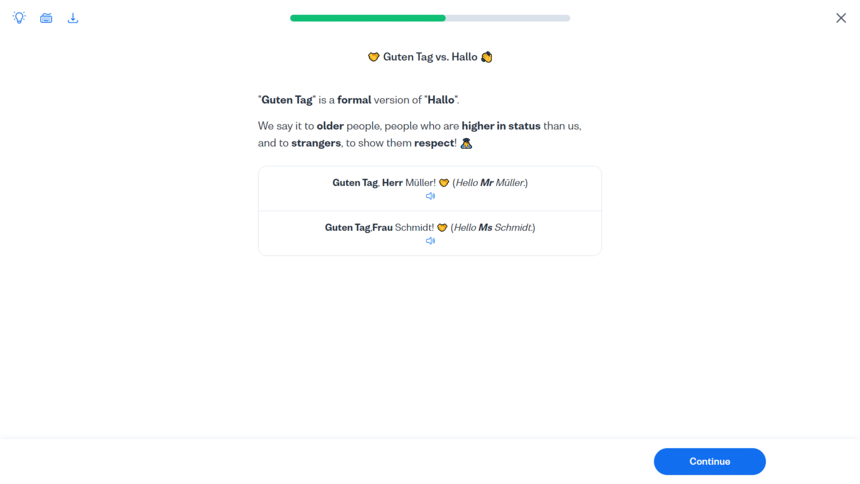
This is just something they add on to the end of lessons to keep you motivated. If you’re talking about real, substantive add-ons, like podcasts, games, audio companion lessons, phrasebooks, and on demand video lectures, you don’t get any of that with Busuu.
Other apps like Babbel and Rosetta Stone are pretty good about providing these extra features, so I’d like to see Busuu incorporate some more supplemental tools. It would make the program feel more complete and well-rounded.
Disjointed Feel
Lastly, the final negative with this course is a counterpoint to one of my positives. Although I like that the lessons are short and bite-sized, they can border on being cursory. Sometimes you’ll do a lesson in two minutes flat and think, “That was it? Really?”.
In that respect, Busuu is a lot like Duolingo. It’s convenient that the lessons are so short, but it’s also not super effective, because they’re an inch deep.
Obviously you can do three or four lessons in a row to get your study time in, but the short lesson length kind of gives those sessions a choppy, disjointed feel. Bottom line, the short duration of the lessons can be a blessing and a curse.
Verdict: Is Busuu Worth It?
While I generally like Busuu, this program isn’t perfect. I like the video clips of fluent speakers, the hands-on and fast-moving lessons, the dedicated spaced review, and the linear lesson path. However, I’m not sold on just how fast the lessons move and all of the Duolingo-like window dressing. It kind of gives the lessons a cursory and choppy feel. Plus, I really wish there was speech software.
All in all, I would say that Busuu isn’t my favorite program, but it’s not my least favorite program either. It kind of lands in the middle of the pack. I’d use it before others like Duolingo, Michel Thomas and Fluenz, but I also definitely prefer other apps, like Babbel, Pimsleur and Rocket Languages. So bottom line, if you want short, engaging lessons and a community environment to learn a new language, all at a decent price, Busuu would be a great fit for you. If, however, you’re more flexible on learning style, then in terms of direct competition, I would actually point you towards Babbel. I think their program is superior following both program’s updates.
👉 Read Next: Babbel Spanish Review
Busuu is a language learning company that offers courses for over 10 different languages. The company offers apps for web, iOS and Android. It is one of the most popular language learning tools on the market with 100+ million subscribers.
Busuu offers a free plan for people to learn a new language. However, in order to unlock all features and content, you must sign up for a Busuu Premium plan, which costs between $4 and $15 per month.
Yes and no. There are certainly features that our team likes about Busuu’s program, but at the end of the day, there are more effective language learning apps on the market.




